- Home
- Don DeLillo
Mao II Page 6
Mao II Read online
Page 6
“How long have you been with him?”
“Eight years. The last few have been tough on him. He’s gone back to drinking although not so heavily as before. He takes medications for ailments unknown to science. He rarely sleeps past five a.m. Wakes and stares. When the sun comes up, he shuffles to his desk.”
“To me, publication is exactly what he needs. You have to show people what you’ve done. How else do you resolve anything?”
“Bill is at the height of his fame. Ask me why. Because he hasn’t published in years and years and years. When his books first came out, and people forget this or never knew it, they made a slight sort of curio impression. I’ve seen the reviews. Bric-a-brac, like what’s this little oddity. It’s the years since that made him big. Bill gained celebrity by doing nothing. The world caught up. Reprint after reprint. We make a nice steady income, most of which goes to his two ex-wives and three ex-children. We could make a king’s whatever, multimillions, with the new book. But it would be the end of Bill as a myth, a force. Bill gets bigger as his distance from the scene deepens.”
“Then why do you want these photographs?”
“I don’t want. He wants.”
“I see,”
“I’ve said again and again. Craziness. I’ve harangued the poor man. Don’t do it. Madness. Self-destructive.”
“I didn’t realize from your manner.”
“Because I do my job. He makes the decisions, I follow through. If he decides to publish, I’ll work with him day and night on the galleys, the page proofs, everything. He knows that. But for Bill, the only thing worse than writing is publishing. When the book comes out. When people buy it and read it. He feels totally and horribly exposed. They are taking the book home and turning the pages. They are reading the actual words.”
In the attic there were file cabinets containing research material. Scott recited subject headings and showed her dozens of color-coded folders. His desk and typewriter were here. There were cardboard boxes filled with loose manuscript pages. There was a large photocopy machine and shelves lined with reference books, style manuals and stacks of periodicals. He handed Brita a pale-gray manuscript box, unmarked, and gestured to six identical boxes on the desk and said this was the final version, the typed and corrected and proofread copy of Bill’s new novel.
But Bill was still working, making changes. They heard him typing when they went down the stairs.
He had coffee and a sandwich at his desk. Then tapped on the keys, hearing an old watery moan deep in the body. How the day’s first words set off physical alarms, a pule and fret, the resistance of living systems to racking work. Calls for a cigarette, don’t you think? He heard them come down the stairs and pictured them making an effort not to creak, setting their feet down softly, shoulders hunched. Let’s not disturb the family fool in the locked room. He didn’t know whether she was leaving right away. He thought it would be awkward to see her again. There was nothing to say, was there? They’d shared a closeness that felt sorry and cheap the minute she walked out of the room. He couldn’t clearly recall what he’d said to her but knew it was all wrong, an effusion, a presumption, all the worse for being mainly true. Who was she anyway? Something strong in her face, the rigor of life choice, of what it takes to make your way, a stripped-down force, a settledness, bare but not unwary. He could easily get up from the desk and go to New York and live with her forever in a terrace apartment overlooking the park or the river or both. Staring past the keys. Used to be that time rushed down on him when he started a book, time fell and pressed, then lifted when he finished. Now it wasn’t lifting. But then he wasn’t finished. Live in a large bright apartment with gray sheets on the bed, reading perfumed magazines. There is the epic and bendable space-time of the theoretical physicist, time detached from human experience, the pure curve of nature, and there is the haunted time of the novelist, intimate, pressing, stale and sad. His teeth felt soft today. He needed to sneak to the bedroom and mix up some pink-and-yellow fluoride multivitamins and in the meantime let’s concentrate on the page, tap a letter, then another. He wanted to fuck her loudly on a hard bed with rain beating on the windows. Please Jesus let me work. Every book is a bug-eyed race, let’s face it. Must finish. Can’t die yet. He struck enough keys to make a sentence and thought about going down to say goodbye to her but it would only embarrass them both. Got what she came for, didn’t she? I’m a picture now, flat as birdshit on a Buick. He saw he’d inverted two letters, which he’s been doing a lot of lately, one of many signs there’s something growing on his brain, and he elevated the page and whited out the mistake, then had to wait while the liquid dried. How he punished himself for repeated errors at the machine, eternal misfingerings, how typing mistakes became despair, meaningless flubs bringing a craze to his eyes, and he stared at the white fluid drying and would not resume work until it faded into the page, which was both the punishment and the escape. Her hand on his face, how surprised he’d been to feel so affected by the gesture, the entireness of simple touch. Want to live like other people, eating tricolor pasta in trattorias near the park. Always whiting out and typing in. He looked at the sentence, six disconsolate words, and saw the entire book as it took occasional shape in his mind, a neutered near-human dragging through the house, humpbacked, hydrocephalic, with puckered lips and soft skin, dribbling brain fluid from its mouth. Took him all these years to realize this book was his hated adversary. Locked together in the forbidden room, had him in a chokehold. He examined the immense complexity of changing the ribbon. So many pros and cons, alters and egos. He felt it coming and then sneezed onto the page, nicely, noting blood-spotted matter but thin and sparse. He would not dignify it by calling it snot. She likes my anger. Live at the center of the cubist city, Sunday papers spread everywhere and glossy bagels on a plate. I’m between novels, he used to say, so I don’t mind dying. The problem with his second wife. But never mind. Live near the museums and galleries, stand on movie lines, uncork the wines, redo the rooms, sleep in the gray sheets, loving her, ordering out, let’s order out tonight, walk the dogs, speak the words, hear the doormen whistle down the cabs, rain beating on the windows.
Brita was packed and ready anytime. She went downstairs and poured a cup of coffee. She sat at the table and looked around the kitchen. A young woman walked in and softly said Hi. She leaned on the table, using a hand to balance, her left foot raised vaguely off the floor. She had long straight hair, light brown, and a slightly jutting mouth that made her look remorseless.
“How many pictures did you take?”
“We talked and worked a while and then I shot some more rolls when we ran out of conversation and then some more after that.”
“Would you call this an average day or going into the realm of horrid excess?”
“What’s your name?”
“Karen.”
“And you live here.”
“Scott and I.”
“I’ll tell you the truth, Karen. I’m not interested in photography. I’m interested in writers.”
“Then why don’t you stay home and read?”
She reached for a box of muffins on the countertop and put it down near Brita’s coffee. Then she curled into a chair and played with a stray spoon. She wore a limp blouse over blue jeans and had the body lines of a teenager, the crooks and skews and smeariness, and a way of merging with furniture, a kind of draped indecision.
Brita said, “I read at home, I read in hotels, I take a book with me on a twenty-minute trip to the dentist. Then I read in the waiting room.”
“Did you always know you wanted to be a photographer?”
“I read on planes, I read in laundromats. How old are you?”
“Twenty-four.”
“And you help out here.”
“Scott does most of it. He manages the expenses, the cash flow, he does taxes, he deals with the utilities, he answers all Bill’s mail except the mentals, which we haughtily ignore lest they get encouraged. We share the cooking and sho
pping except he probably does more than I do. He does all the filing, the organizing of papers. I clean like a little scrub lady, which I don’t half mind. I make believe I’m fat and walk with a waddle. We do the typing about fifty-fifty, with Scott doing the last spotless copy, and then we proofread together, which is probably our favorite time.”
“And you think it’s a mistake, these pictures.”
“We love Bill, that’s all.”
“And you hate me for leaving here with all that film.”
“It’s just a feeling of there’s something wrong. We have a life here that’s carefully balanced. There’s a lot of planning and thinking behind the way Bill lives and now there’s a crack all of a sudden. What’s it called, a fissure.”
The car pulled up, door opened, then closed. Karen tapped the bowl end of the spoon with her index finger, over and over, making the handle go up and down.
“What do you think of marriage for a professional woman?” she said.
“I’m divorced many years. He lives in Belgium. We don’t talk at all.”
“Do you have children that are still torn up over the divorce so that everybody’s tense around each other and you can see the resentment lurking far back in their eyes even after all this time?”
“Sorry, no.”
“I haven’t known many people with careers. It sounds so important. Having a career. Do you keep a bottle of vodka handy in your freezer?”
“Yes, I do.”
“Do people tell you they like your work? They come up to you at parties in New York and say, ‘I just wanted to tell you.’ Or, ‘You don’t know me but I just wanted.’ Or, ‘I really have to tell you this and I hope you’ll forgive the intrusion.’ Then you look at them and smile like shyly.”
Scott came in with groceries. He poured a cup of coffee and told the story of his journey out of nonbeing. How he started writing letters to Bill care of his publisher. He wrote nine or ten letters, ambitious and self-searching, filled with things a luckless boy wants to say to a writer whose work has moved him. He hadn’t known he could summon these deep feelings or express them with reckless style and delight, certain cosmic words typed in caps and others spelled oddly to reveal second and third meanings. The letters released something, maybe a sense that he was not alone, that the world was a place where travelers in language could know the same things. How he finally got one letter back, two lines, handwritten in a hurry, saying there is never time to respond properly but thanks for writing. How Scott took this as encouragement and wrote five more letters, intense and sweeping, the last of them saying that he was setting out to find Bill, that he needed to see and meet and talk to Bill, that the urge to make a journey in search of the man who wrote these books could no longer be contained. How Bill did not reply. And how Scott took this as encouragement because Bill could have written and said, Forget it, stay away, do not even remotely approach. He had the envelope Bill’s note had come in, postmarked New York City, but Scott happened to know from reading a magazine piece about Lost Writers that Bill concealed his whereabouts by sending letters to his publisher for remailing.
“And so you hitchhiked.”
Yes. He set out thumbing rides at the edges of ripping interstates and the venture was so chancy it made him feel weightless, standing in the wind of rolling diesel rigs. He wore mirrored glasses and carried a timeless Eastern text and he told drivers he was setting out to find a famous writer. Some of them talked about famous people they wished they could meet and it was interesting how very few of these people were alive today. All the famous were either dead or used up. A pickup he was riding in caught fire just west of Fort Wayne and it seemed all right, it seemed appropriate, things were too vivid not to enter deeper states. He was elated, worked to a sensory howl, flying past the low stink of day-to-day. A driver had chest pains outside Toledo and Scott drove him to a hospital, feeling talkative, telling the man the plot of a movie he’d seen last week. The car handled well and he gained in being as he drove, cornering sweetly. I’m glad we had this chance to talk, he said, jogging alongside the gurney as attendants hustled the man into white light. Three days later he had a job in the mailroom at the house that published Bill Gray’s books.
How he made friends. How he learned that the letters Bill sent in to be remailed came in a nine-by-twelve manila envelope addressed to the head of the mailroom, a friendly sleepy former IRA man named Joe Doheny, who opened the envelope and processed the letters in the normal way. Scott waited, living at the Y, eating his meals standing up at narrow counters set along streetside windows so he could watch the march of faces and pathologies, people going by in trance states and dancing manias, the crosstown stream of race and shape and ruin, and in these hard streets even the healthy and well-dressed looked afflicted. Because they were sliding deeper into their own lives. Because they knew the future would not take them. Because they refused to give themselves the necessary narrow structure, the secret destiny. After some weeks he spotted a manila envelope addressed to Joe Doheny in Bill’s close-woven hand. There was no return address of course but Scott looked at the postmark and then went to the library and lugged an atlas to a table and found that the town in question—he did not reveal its name to Brita—was about two hundred miles outside the gates of the medieval city. He was not necessarily relieved to learn that Bill was only hours from New York. It would be just as easy to go to Chad or Borneo or the Himalayas, with perhaps a greater gain in being.
He took a bus part of the way and then hitchhiked on secondary roads, carrying a sleeping bag and other basics. He walked around town and watched the market and the post office, five weekends of vain surveillance. Not that he minded. He had a life now and that’s what mattered. He was in Bill’s material mesh, drawing the same air, seeing things Bill saw. He did not ask people if they knew who Bill was or where he lived. He was a backpacker on the amble, determined to go unnoticed. After weekend five he quit his job and lived in campgrounds in the area and saw a man who had to be Bill getting out of a car in front of the hardware store, only eight days after he’d left the city for good.
“Why did it have to be Bill?”
“Had to be. Not the slightest doubt. How can a photographer ask a question like that? Doesn’t his work, his life show on his face? Are there other people in that one small rural area who might possibly look as though they’d written those books? No, had to be him. Stocky, running his hand through his hair. Walking toward me. Making his way down the street. Becoming more familiar with every step. Had to be Bill and he was coming right at me and I seemed to need oxygen. Important parts of my body were closing down.”
How he stepped up to Bill and told him who he was, the persistent letter-writer, and made an effort to speak slowly and clearly in complete sentences, feeling his mouth dry out and hearing the words come bouncing hollow off his tongue. Hearing the heart noise, a deep staccato in the chest that he’d heard only once before, climbing for hours in mountain country in extreme heat, the sound of blood driving through the aorta and jarring the heart. How he managed to say as Bill’s eyes narrowed to rifleman’s slits that he wondered if the writer had ever thought an assistant might be helpful, someone to handle the mail (he had experience), a quiet individual who would type and file, even prepare meals if there was no one doing this, a person who would try to ease the writer’s beleaguerment (he drew a trace of grim amusement here). And then on instinct simply stopped and let Bill absorb the offer while he stood there looking earnest and dependable. Watching Bill’s face begin to change. How the jaw muscles slackened and the eyes grew calm. A great man’s face shows the beauty of his work.
5
Karen was in the bedroom looking at the gift Scott had brought back from the city. It was a reproduction of a pencil drawing called Mao II. She unrolled it on the bed and used objects in reach to hold down the corners. She studied the picture to see what was interesting about it or why Scott thought she might like it. The face of Mao Zedong. She liked that name all right. It was
strange how a few lines with a pencil and there he is, some shading in, a scribbled neck and brows. It was by a famous painter whose name she could never remember but he was famous, he was dead, he had a white mask of a face and glowing white hair. Or maybe he was just supposed to be dead. Scott said he didn’t seem dead because he never seemed real. Andy. That was it.
Scott was washing coffee cups.
Bill came in and said, “What are you doing?”
Scott looked into the basin, running a sponge around the inside of a cup.
“We could walk up to the mill. It’s a nice enough day.”
“You have to work,” Scott said.
“I’ve worked.”
“It’s early yet. Go back and work some more.”
“I’ve put in some good time today.”
“Bullshit. You were having your picture taken.”
“But I caught up. Come on. We’ll get the women and hike to the mill.”
“Go back up.”
“I don’t want to go back up.”
“Don’t start. I’m not in the mood.”
“We’ll get the women,” Bill said.
“It’s early. You ruined your morning with picture-taking. Go back up and do your work.”
Scott held the sponge under warm water, rinsing out the soap.
“We have three hours of light. Ample time to get there and back. ”
“I’m telling you for your own good. It’s your idea to write this book forever. I’m only saying what I’m supposed to say. ”
“You know what you are?”
“Yeah yeah yeah yeah, ”
“Yeah yeah,” Bill said.
“I don’t think you did ten good minutes.”
“Yeah yeah yeah.”
“So go back up and sit down and do your work.”

 Great Jones Street (Contemporary American Fiction)
Great Jones Street (Contemporary American Fiction)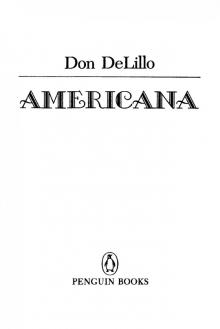 Americana
Americana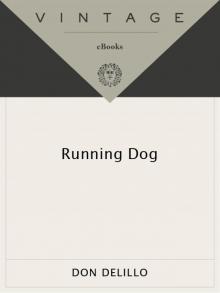 Running Dog
Running Dog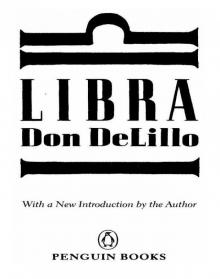 Libra
Libra End Zone
End Zone Ratner's Star
Ratner's Star Underworld
Underworld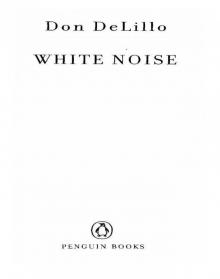 White Noise
White Noise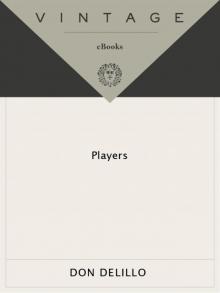 Players
Players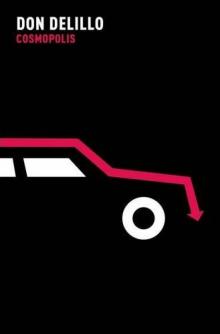 Cosmopolis
Cosmopolis The Silence
The Silence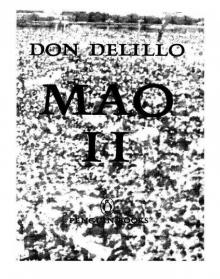 Mao II
Mao II Zero K
Zero K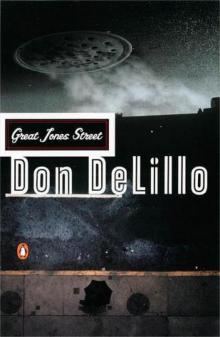 Great Jones Street
Great Jones Street The Angel Esmeralda
The Angel Esmeralda The Names
The Names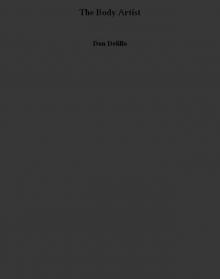 The Body Artist
The Body Artist Point Omega
Point Omega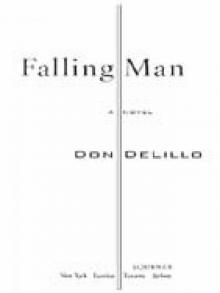 Falling Man
Falling Man